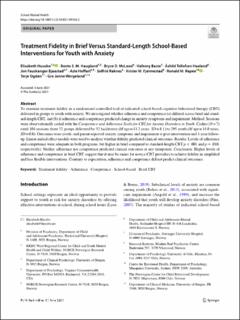| dc.contributor.author | Husabo, Elisabeth | |
| dc.contributor.author | Haugland, Bente Storm Mowatt | |
| dc.contributor.author | McLeod, Bryce D. | |
| dc.contributor.author | Baste, Valborg | |
| dc.contributor.author | Håland, Åshild Tellefsen | |
| dc.contributor.author | Bjåstad, Jon Fauskanger | |
| dc.contributor.author | Hoffart, Asle | |
| dc.contributor.author | Raknes, Solfrid | |
| dc.contributor.author | Fjermestad, Krister W. | |
| dc.contributor.author | Rapee, Ronald M. | |
| dc.contributor.author | Ogden, Terje | |
| dc.contributor.author | Wergeland, Gro Janne | |
| dc.date.accessioned | 2021-11-03T09:23:25Z | |
| dc.date.available | 2021-11-03T09:23:25Z | |
| dc.date.created | 2021-07-27T12:43:40Z | |
| dc.date.issued | 2021 | |
| dc.identifier.issn | 1866-2625 | |
| dc.identifier.uri | https://hdl.handle.net/11250/2827510 | |
| dc.description.abstract | To examine treatment fidelity in a randomized controlled trial of indicated school-based cognitive-behavioral therapy (CBT) delivered in groups to youth with anxiety. We investigated whether adherence and competence (a) differed across brief and standard-length CBT, and (b) if adherence and competence predicted change in anxiety symptoms and impairment. Method: Sessions were observationally coded with the Competence and Adherence Scale for CBT for Anxiety Disorders in Youth. Coders (N = 7) rated 104 sessions from 52 groups delivered by 32 facilitators (M age = 43.2 years, SD = 8.1) to 295 youth (M age = 14.0 years, SD = 0.8). Outcomes were youth- and parent-reported anxiety symptoms and impairment at post-intervention and 1-year follow-up. Linear mixed effect models were used to analyze whether fidelity predicted clinical outcomes. Results: Levels of adherence and competence were adequate in both programs, but higher in brief compared to standard-length CBT p < .001 and p = .010, respectively). Neither adherence nor competence predicted clinical outcomes at any timepoints. Conclusion: Higher levels of adherence and competence in brief CBT suggest that it may be easier for novice CBT providers to achieve fidelity in simplified and less flexible interventions. Contrary to expectation, adherence and competence did not predict clinical outcomes. | en_US |
| dc.language.iso | eng | en_US |
| dc.publisher | Springer | en_US |
| dc.rights | Navngivelse 4.0 Internasjonal | * |
| dc.rights.uri | http://creativecommons.org/licenses/by/4.0/deed.no | * |
| dc.title | Treatment Fidelity in Brief Versus Standard-Length School-Based Interventions for Youth with Anxiety | en_US |
| dc.type | Journal article | en_US |
| dc.type | Peer reviewed | en_US |
| dc.description.version | publishedVersion | en_US |
| dc.rights.holder | Copyright 2021 the authors | en_US |
| cristin.ispublished | true | |
| cristin.fulltext | original | |
| cristin.qualitycode | 1 | |
| dc.identifier.doi | 10.1007/s12310-021-09458-2 | |
| dc.identifier.cristin | 1922768 | |
| dc.source.journal | School Mental Health | en_US |
| dc.identifier.citation | School Mental Health. 2021. | en_US |

